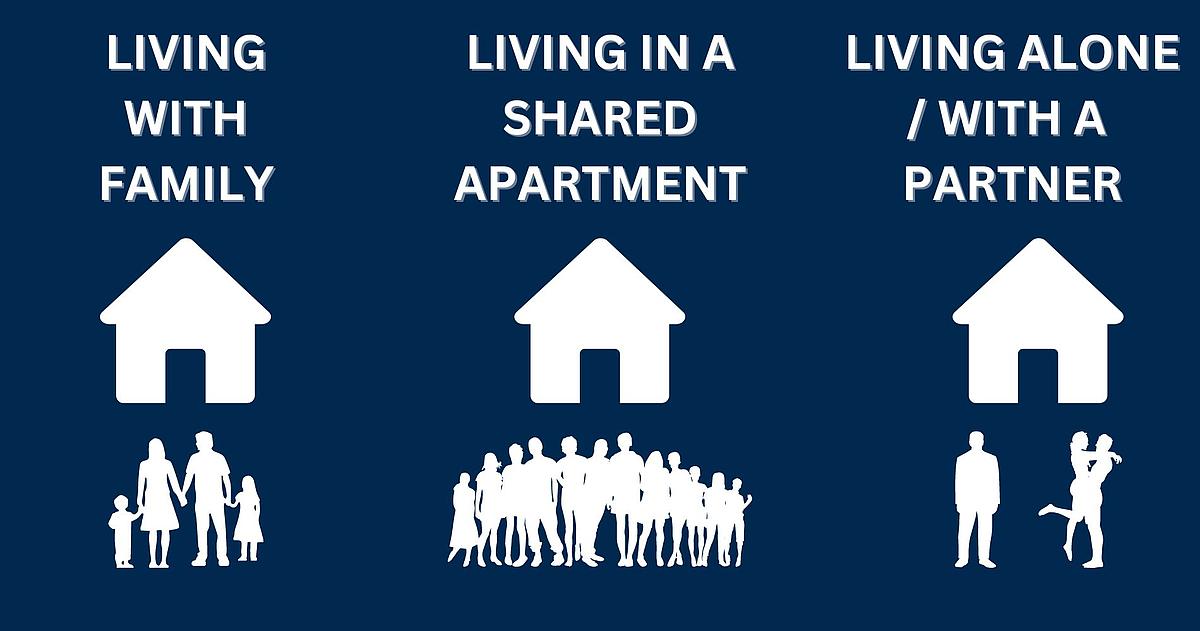This Website uses cookies to improve your visit on our website. More Info
Living in a shared Apartment
Are you about to decide to move into a shared flat and don't know what to expect? Our guide offers you an in-depth look into the world of living in a shared apartment, including valuable tips and tricks, a balanced presentation of the pros and cons and a comprehensive overview of the rules of cohabitation. We'll equip you with the knowledge you need to make an informed decision and realize the full potential of your future shared apartment. Take the first step into a new chapter of your life with confidence and anticipation.
Shared Apartment Definition
A shared flat is a form of cohabitation in which several people who do not belong to a family share an apartment or house. In a shared flat, each resident usually has their own bedroom, while the kitchen, bathroom and possibly other rooms such as the living room are shared. This form of housing is often chosen by students or young professionals in order to save costs and maintain social contacts. Shared flats can be based on different forms of organization, from rather loose communities to very structured and rule-based forms of cohabitation in which tasks, costs and responsibilities are clearly distributed.
The concept of the shared home as we know it today emerged in the 1960s and 1970s in the wake of social and cultural movements that sought alternative forms and models of living to the traditional family image. These movements strove for more freedom, equality and community. Shared flats offered a platform for experimental cohabitation based on shared values and mutual support. They became a symbol of independence, social commitment and the desire to question and reshape outdated social norms and structures.
Living in a shared Apartment Advantages and Disadvantages
The following table provides an overview of the main aspects to consider when deciding whether or not to live in a shared apartment. These are the advantages and disadvantages of living in a shared apartment summarized:
| Advantages | disadvantages |
|---|---|
| Cost sharing: Rent and ancillary costs are shared between the residents, which makes living more affordable. | Privacy: Less privacy compared to living alone, as rooms such as the kitchen and bathroom are shared. |
| Company: Constant company and the opportunity to make new friends. | Conflicts: Potential conflicts due to different lifestyles, ideas about cleanliness, etc. |
| Sharing tasks: Household chores can be split, giving individuals less work. | Compromises: Need to compromise on decisions (e.g. furnishings, use of shared spaces). |
| Support: Emotional and practical support in everyday life. | Instability: Frequent changes of roommates can lead to instability and the need to adapt. |
| Learning opportunities: Exchange of skills, knowledge and cultures among residents. | Regulation of living together: Need to establish and follow clear rules for living together. |
Living in a shared apartment Tips
To make living together in a shared apartment as pleasant and smooth as possible, the following tips and tricks for living in a shared apartment can be helpful:
- Make clear agreements: Make clear agreements about cleanliness, rest periods, visits and finances right from the start.
- Create a cleaning schedule: A rotating cleaning schedule helps to maintain cleanliness in shared areas without anyone feeling disadvantaged.
- Set up a common cash register: Have a common cash register for purchases of common items such as toilet paper, spices or cleaning supplies.
- Regular shared flat meetings: Organize regular meetings to discuss upcoming issues, resolve conflicts and strengthen the sense of community.
- Flexibility and openness: Be open to new people and experiences, but also flexible when it comes to rules and agreements.
- Take responsibility: Take responsibility for your own actions and actively contribute to the well-being of the shared flat.
- Value time together: Occasional shared activities such as cooking evenings, movie nights or simply a chat between the door and the door promote cohesion.
- Organize digitally: Use apps or online tools to manage shopping, bills and cleaning schedules.
- Maintain patience and a sense of humor: Patience and a sense of humor can make many everyday situations easier to deal with.
By taking these tips to heart, living in a shared apartment can be an enriching and positive experience. However, not every tip is suitable for all shared flats. Don't try to force something through that doesn't suit you.

Unwritten shared Apartment Rules
The unwritten rules of living in a shared apartment are often based on mutual respect and common sense to ensure harmonious coexistence. These rules for harmonious living in a shared apartment serve as a guide for respectful and considerate coexistence in everyday shared apartment life. Here are some of the most important unwritten rules for living in a shared apartment:
- Maintain cleanliness: Keep communal areas clean and tidy up after yourself, especially the kitchen and bathroom.
- Respect noise levels: Be aware of noise levels, especially in the evening and at night, so as not to disturb roommates.
- Respect privacy: Respect your roommates' privacy and knock before entering their room.
- Use shared resources fairly: Be fair when using shared resources such as food, washing machine or bathroom and don't overdo it.
- Communication: Open and honest communication about expectations, problems and changes is essential.
- Announce visitors: Inform your flatmates about planned visits or parties in advance and ask for permission first if necessary.
- Share common costs: Organize a fair system for sharing the cost of common purchases or utilities.
- Resolve conflicts constructively: Approach conflicts directly but respectfully and look for solutions together.
- Promote community: Participating in joint activities and creating opportunities to get together strengthens the sense of community.
- Handle rules flexibly: Be willing to discuss and adapt rules to meet the needs of all residents.
Living in a shared Apartment: With friends or Strangers?
The decision to start living in a shared apartment with friends or strangers each comes with pros and cons. Here are some considerations to help you decide:
Living with Friends
Advantages:
- Familiar environment: Living with friends can be fun and create a strong sense of community.
- Familiar dynamics: You already know the personalities and habits of your friends and already have common interests.
Disadvantages:
- Putting friendship to the test: Conflicts in everyday life can put a strain on the friendship.
- Less privacy: The boundaries between friendship and private life can become blurred.
- Difficulties with criticism: Personal relationships can make open criticism or addressing problems more difficult.
Living with Strangers
Advantages:
- New perspectives: Living together with people from different backgrounds can be enriching.
- Clear boundaries: Personal boundaries are often more clearly defined, which protects privacy.
- Objectivity: Decisions and conflicts can often be approached more objectively.
Disadvantages:
- Unfamiliar dynamics: Adapting to new personalities and habits can be challenging.
- Risk of conflict: Without prior knowledge of roommates, there is a higher risk of conflict.

How to resolve conflicts?
Tips for better communication when living in a shared apartment

| Open communication | Address problems early on before they escalate. Open and honest communication is the key to resolving many conflicts. It is important to remain respectful and let the other person finish speaking. |
|---|---|
| Active listening | Try to understand the other person's perspective by actively listening. Conflicts are often based on misunderstandings that can be clarified by listening attentively. |
| Willingness to compromise | Be prepared to compromise. Not every conflict can be resolved one hundred percent in favor of one party. A joint solution that everyone can live with is often the best way forward. |
| Establish fixed rules | Agree on fixed rules for living together, for example a cleaning schedule or rules for the use of shared rooms. This helps to avoid many everyday conflicts from the outset. |
| Respect personal boundaries | Everyone has different needs in terms of privacy and personal space. Make sure to respect these boundaries to avoid conflicts. |
| Stay problem-oriented | Focus on the problem, not the person. Avoid personal attacks that only make the other person feel defensive. |
| Look for solutions | Work together on solutions instead of fixating on the problem. Brainstorming and creative solutions can often lead to a consensus. |
| Consider mediation | If internal attempts to find a solution fail, external mediation can help. A neutral third party can help to find a solution that is acceptable to all sides. |
| Being able to give in | Sometimes it is better to give in and end a conflict before it seriously affects your life together. Not every small problem is worth a big argument. |
| Promote a positive atmosphere | Promote a positive, supportive atmosphere in your shared flat. Shared activities or simple get-togethers can help to reduce tensions and strengthen the sense of community. |
Conflicts can arise in everyday living in a shared apartment for various reasons, be it because of different lifestyles, cleanliness standards or the use of shared spaces. Dealing constructively with these conflicts is crucial for harmonious coexistence. By applying these strategies, many conflicts in living in a shared apartment can not only be resolved, but often avoided. However, sometimes you just have to admit when a shared flat or flatmate doesn't suit you. Changing flat shares can also be a solution if you see no other way out or have already exhausted all conflict resolution methods and still haven't managed to live in a shared apartment harmoniously.
Living in a shared Apartment Costs
There are several important aspects to consider when living in a shared apartment and the associated costs. The following aspects should be considered and discussed:

Type of tenancy agreement: There are different types of tenancy agreements in shared flats. Individual contracts mean that each resident has their own contract with the landlord and is only responsible for their own rent. In a collective contract, all members of the shared flat sign a contract together, which means that they are jointly liable for the rent and any damage.
Splitting the rent: The rent should be split fairly and take into account factors such as the size and location of the rooms. A larger room, for example, may or may not be associated with a higher share of the total rent. Ultimately, all flatmates must be in agreement.
Service charges: In addition to the basic rent, there are usually also service charges that have to be paid for electricity, water, heating, internet and possibly other services such as garbage collection. These should also be divided between the tenants. Clarify in advance whether these costs are included in the rent or will be charged additionally. It is important to come to an agreement early on before one person accuses the other of using more hot water, etc.
Deposit: A deposit is often required as security for the landlord. In the case of a joint contract, the tenants share the deposit, whereas in the case of individual contracts, each tenant pays their own deposit. The repayment conditions should be clearly understood and documented.
Household budget: A household budget can be useful for common expenses such as cleaning products or toilet paper. This ensures that the same person does not always pay for common goods. Or everyone simply buys their own things and only uses them.
Rules for moving out: What happens when someone moves out? Clarify how the new rent will be divided up and under what conditions a new roommate will be accepted.
Contractual obligations: All flat share members should be clear about their rights and obligations. This includes regulations on notice periods, subletting and dealing with damage.
It is important to discuss all these aspects openly and ideally to make written agreements in order to avoid misunderstandings or conflicts later on.
Various forms of living
Most people live in three different forms of housing, which can be the right form for different people depending on their needs and ideas.

Shared Apartment Forms
There are various forms of shared apartments (WGs), which differ depending on the needs and ideas of the residents when living in a shared apartment. Here are some common types of shared flats:
Classic shared Apartment
Several people share an apartment, with each person having their own room and sharing the kitchen, bathroom and possibly other rooms. The residents organize their life together jointly.
Functional shared Apartment
The focus here is less on communal living and more on the practical consideration of sharing living space in order to save costs. The flatmates lead more of an independent life.
Project Apartment share
This form of shared apartment is often based around a common interest, goal or project, such as artistic projects, sustainable living or collaborative work.
Family shared Apartment
Several families or single parents share a larger apartment or house. This can provide a supportive community for raising children and organizing everyday life.

Senior shared Apartment
Older people live together to avoid loneliness and to support each other in everyday life. These shared flats are often tailored to the special needs of older people.
Student shared Apartment
Typically occupied by students who are studying together or are enrolled at the same university. These shared flats are often price-conscious and geared towards the needs of study.
Shared Apartment for Professionals
Residents are already working and share an apartment to save costs and/or avoid having to live alone. The focus is often more on rest and relaxation after work and a regular daily routine.
Addition: Number of Roommates
The optimal number of flatmates in a shared flat depends on various factors, such as the size of the apartment, the number and layout of the rooms and the individual needs and preferences of the residents. Typically, shared flats have between two and five residents, but there are also larger shared flats with six or more people. The number of flatmates is less important for harmonious cohabitation than good communication and compatibility of lifestyles.
Looking for a shared apartment or founding one?
The decision to move into an existing shared flat or to set one up yourself has advantages and disadvantages. Here are some aspects that can help you make your decision:
Moving into an existing shared Apartment
Advantages:
- Available immediately: Rooms are often available immediately or at short notice.
- Less organization: Structures and rules are already established, which makes moving in easier.
- Cost-efficient: Deposits and initial furnishings for shared rooms are usually already available.
- Quick and easy process: The shared apartment is already furnished and structures for living together are established.
- Social integration: Direct connection to a social environment and the opportunity to get to know new people quickly.
Disadvantages:
- Adaptation: You have to adapt to existing rules and the living culture.
- Less influence: The opportunity to shape the shared apartment according to your own ideas is limited.
Set up a shared Apartment yourself
Advantages:
- Free design: You can choose the apartment yourself and design the shared apartment according to your ideas and needs.
- Choice of flatmates: You have control over who you live with.
- New start: The chance to build a new community from scratch.
Disadvantages:
- More organization: The search for suitable living space and suitable flatmates as well as the initial furnishings require time and energy.
- Higher initial costs: Deposits and purchases for communal areas are incurred at the beginning.
Find a shared Apartment
Finding a shared apartment (WG) in Germany and starting living in a shared apartment can be done in different ways. Here are some effective methods:
- Online platforms: Websites such as WG-gesucht.de, Studenten-WG.de or eBay Kleinanzeigen are popular places in Germany to go where new shared rooms and apartments are advertised every day. Users can filter by city, room size and rental price.
- Social media: Many cities have Facebook groups or forums for apartment seekers and shared apartment start-ups. You can also find search ads or post them yourself on platforms such as Instagram or Twitter.
- Universities and colleges: Many educational institutions offer bulletin boards (physical or online) where room offers and requests are posted. Some also have housing agencies that specifically help students.
- Use your network: Inform friends, family and acquaintances about your search. Personal contacts often result in offers that are not publicly advertised.
- Local newspapers and advertising journals: You can also find shared apartment offers in the classified ads of local daily newspapers or weekly newspapers. Although this method is more traditional, it can be very effective in some regions.
- Posters in the city: Cafés, libraries, supermarkets or universities often have posters of shared apartments looking for flatmates.
- Estate agents or housing associations: Although less common, estate agents or housing associations can sometimes help you find a suitable shared apartment, especially if you are interested in a long-term solution.
When searching, it is important to react quickly, as the demand for shared apartments is particularly high in large cities. Prepare your application documents (cover letter, CV, Schufa information and proof of income if applicable) in advance and be flexible when it comes to viewing appointments so that you can start living in a shared apartment quickly.
Frequently asked Questions about living in a shared Apartment
Living in a shared apartment offers both social and financial benefits, but can also present challenges. On the one hand, it makes it possible to share rent and utilities, which is particularly advantageous in expensive cities. The communal living arrangement also promotes social interaction and can lead to deep friendships. On the other hand, living together in a shared apartment requires a willingness to compromise and clear communication, especially with regard to cleanliness, noise and the use of common areas. Conflicts can arise when roommates have different ideas about order and privacy. Good management of communal areas and open communication are therefore crucial for harmonious coexistence.
Living in a shared apartment offers several advantages. It is often cheaper than living alone, as rent and utilities are shared. It also offers the opportunity to meet new people and make friends, which is particularly attractive for those who are new to a city or looking to expand their social circle. Living with others can also reduce feelings of loneliness and provide a supportive community. It also allows life experiences and skills to be shared, such as cooking or organizing the household. Despite the challenges that living together can bring, many people choose a shared apartment for the social benefits and financial savings.
The number of people living in a shared apartment (WG) can vary greatly. Typically, a shared apartment consists of two to five residents, but there are also larger shared apartments where six or more people live together. The exact number depends on the size of the apartment or house and the preferences of the residents. In some cities, where housing is particularly scarce and expensive, people tend to live together in larger groups in order to share costs and live more affordably.
You can contribute to living in a shared apartment in various ways. Financially, this means paying your share of the rent, utilities and shared expenses on time. On a social level, you can create a positive atmosphere by being open and communicative, dealing with conflicts constructively and showing respect and consideration for the needs and privacy of your flatmates. In everyday life, everyone contributes to the quality of life by regularly cleaning and maintaining the common areas, sharing tasks and occasionally cooking together or organizing shared apartment events. Flexibility and a willingness to compromise are also important to ensure harmonious coexistence.
Yes, even as a resident of a shared apartment you can apply for housing benefit under certain conditions. Housing benefit is a state benefit in Germany that is used to partially reimburse low-income people for their housing costs. Income, rent and the number of people living in the household are decisive for approval. In the case of a shared apartment, only the portion of the rent attributable to the applicant is usually taken into account. It is important that you can present an official tenancy agreement and that the rent and your own income do not exceed certain limits. The exact conditions and requirements may vary depending on the local authority, so it is advisable to obtain information and advice from the relevant authority.
Interested in a study program? Request our information material now!
More exciting degree programs in Munich













